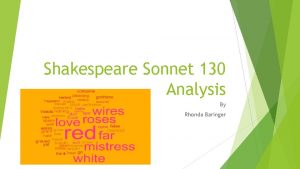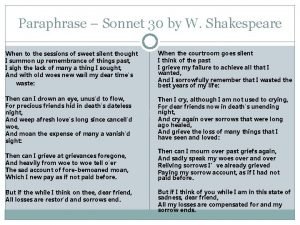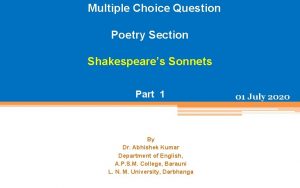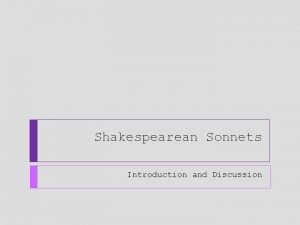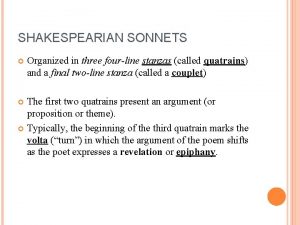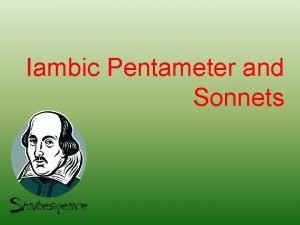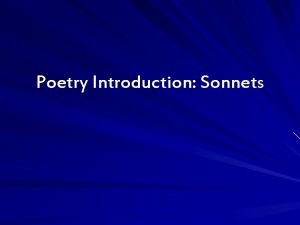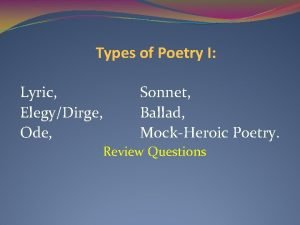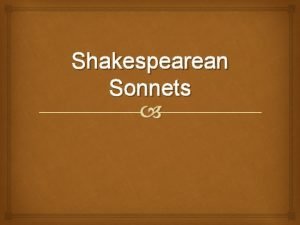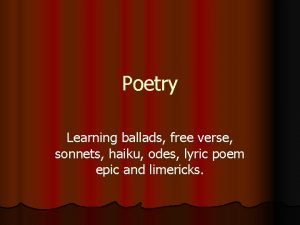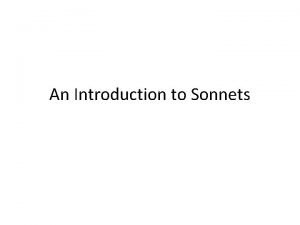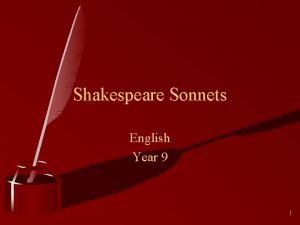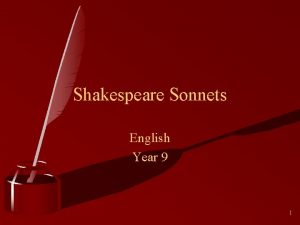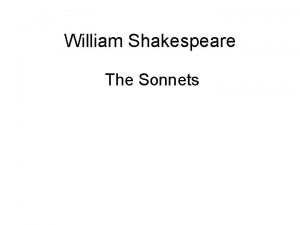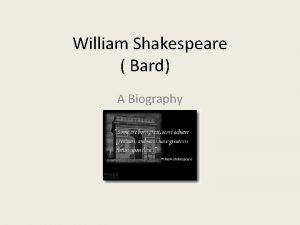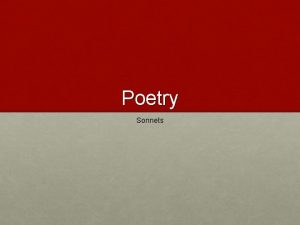Shakespeare Sonnets English Year 9 1 William Shakespeare



![• Sonnet 131 [I’d sing of Love in such a novel fashion] Petrarch, • Sonnet 131 [I’d sing of Love in such a novel fashion] Petrarch,](https://slidetodoc.com/presentation_image_h2/04823d4a060df64bce42e81fa54a9615/image-4.jpg)
























- Slides: 28

Shakespeare Sonnets English Year 9 1

William Shakespeare 2

Petrarchan Sonnets • Became popular during the Italian renaissance when an Italian poet called Petrarch published a sequence of love sonnets addressed to an idealised woman called Laura • It spread through Europe where poets wishing to write about love and romance popularised the form • Shakespeare adapted the traditional Petrarchan sonnet to create his own version
![Sonnet 131 Id sing of Love in such a novel fashion Petrarch • Sonnet 131 [I’d sing of Love in such a novel fashion] Petrarch,](https://slidetodoc.com/presentation_image_h2/04823d4a060df64bce42e81fa54a9615/image-4.jpg)
• Sonnet 131 [I’d sing of Love in such a novel fashion] Petrarch, 1304 – 1374 I’d sing of Love in such a novel fashion that from her cruel side I would draw by force a thousand sighs a day, kindling again in her cold mind a thousand high desires; All this I’d do because I do not mind my discontentment in this one short life, but glory rather in my later fame. I’d see her lovely face transform quite often her eyes grow wet and more compassionate, like one who feels regret, when it’s too late, for causing someone’s suffering by mistake; And I’d see scarlet roses in the snows, tossed by the breeze, discover ivory that turns to marble those who see it near them; 4

What is a Shakespearean sonnet? • a lyric poem • consisting of fourteen lines • written in iambic pentameter • with a definite rhyme scheme • and a definite thought structure Iambic what? Oh dear, this is going to be a weird lesson! 5

Iambic Pentameter • Iambic Pentameter is the rhythm and metre in which poets and playwrights wrote in Elizabethan England. It is a metre that Shakespeare uses. • It is five measures, units, or meters, of • iambs 6

Heartbeat. • Quite simply, it sounds like this: dee DUM, dee DUM. It consists of a line of five iambic feet, ten syllables with five unstressed and five stressed syllables. It is the first and last sound we ever hear, it is the rhythm of the human heart beat. 7

An iamb is a metrical foot consisting of an unaccented syllable U followed by an accented syllable /. U / a gain U / im mor U tal / ize

Pentameter? • Well an ‘iamb’ is ‘dee Dum’ – it is the heart beat. • Penta is from the Greek for five. • Meter is really the pattern • • So, there are five iambs per line! (Iambic penta meter ) 9

Iambic pentameter 1 • • 2 3 4 5 U / U / U / One day I wrote her name u pon the strand, U / U / U/U / But came the waves and wash ed it a way: U / U / U / A gain I wrote it with a sec ond hand, U / U / U / But came the tide, and made my pains his prey • Edmund Spenser, Amoretti, Sonnet 75

• It is percussive and attractive to the ear and has an effect on the listener's central nervous system. An Example of Pentameter from Shakespeare: but SOFT what LIGHT through YONder WINdow BREAKS 11

• “But soft, what light through yonder window breaks. ” • Write this down and underline the stressed words. If you cannot remember, go back to slide 5. • • This rhythm is iambic pentameter! Well done! 12

Back to sonnets. • Well, it is a poetic form. • But it has a certain structure as well as a rhyming pattern. 13

Rhyming patterns • Petrarchan (Italian) rhyme scheme: abba, cd, cd abba, cde, cde • The Shakespearean sonnet has three quatrains followed by a couplet (English, or Elizabethan) rhyme scheme: abab, cdcd, efef, gg • More head scratching? 14

Quatrain? • Quatrains are four line stanzas of any kind • I have divided the following sonnet into the three quatrains. • You will also see the rhyming pattern • marked out for you. 15

Sonnet 116 • • Let me not to the marriage of true minds (a) Admit impediments. Love is not love (b) Which alters when it alteration finds, (a) Or bends with the remover to remove: (b) O, no! it is an ever-fixed mark, (c) That looks on tempests and is never shaken; (d) It is the star to every wandering bark, (c) Whose worth's unknown, although his height be taken. (d) Love's not Time's fool, though rosy lips and cheeks(e) Within his bending sickle's compass come; (f) Love alters not with his brief hours and weeks, (e) But bears it out even to the edge of doom. (f) If this be error and upon me proved, (g) I never writ, nor no man ever loved. (g) 16

What does it mean? • Let me not declare any reasons why two True-minded people should not be married. Love is not love Which changes when it finds a change in circumstances, Or bends from its firm stand even when a lover is unfaithful: Oh no! it is a lighthouse That sees storms but it never shaken; Love is the guiding north star to every lost ship, Whose value cannot be calculated, although its altitude can be measured. Love is not at the mercy of Time, though physical beauty Comes within the compass of his sickle. Love does not alter with hours and weeks, But, rather, it endures until the last day of life. If I am proved wrong about these thoughts on love Then I recant all that I have written, and no man has ever [truly] loved. 17

Sonnet 18 • On your own, Identify the rhyme scheme by underlining the rhymed words and labeling abab and so on. • Identify the quantrains and couplets 18

• Shall I compare thee to a summer's day? Thou art more lovely and more temperate: Rough winds do shake the darling buds of May, And summer's lease hath all too short a date: Sometime too hot the eye of heaven shines, And often is his gold complexion dimm'd; And every fair from fair sometime declines, By chance, or nature's changing course, untrimm'd; But thy eternal summer shall not fade Nor lose possession of that fair thou ow'st; Nor shall Death brag thou wander'st in his shade, When in eternal lines to time thou grow'st; So long as men can breathe or eyes can see, So long lives this, and this gives life to thee 19

Sonnet 18 Shall I compare thee to a summer's day? Thou art more lovely and more temperate: Rough winds do shake the darling buds of May, And summer's lease hath all too short a date: Sometime too hot the eye of heaven shines, And often is his gold complexion dimmed, And every fair from fair sometime declines, By chance, or nature's changing course untrimmed: But thy eternal summer shall not fade, Nor lose possession of that fair thou ow'st, Nor shall death brag thou wander'st in his shade, When in eternal lines to time thou grow'st, So long as men can breathe, or eyes can see, So long lives this, and this gives life to thee. A B C d C D E F G G

Thought structure • Octave/ sestet The octave, eight lines, presents a situation or idea. The sestet (sextet), six lines, responds, to the situation or idea in the octave. • Quatrain, quatrain, couplet Each quatrain, four lines, describes and idea or situation which leads to a conclusion or response in the couplet, two lines.

Sonnet 18 • On your own, identify the octave and sestets 22

• Shall I compare thee to a summer's day? Thou art more lovely and more temperate: Rough winds do shake the darling buds of May, And summer's lease hath all too short a date: Sometime too hot the eye of heaven shines, And often is his gold complexion dimm'd; And every fair from fair sometime declines, By chance, or nature's changing course, untrimm'd; But thy eternal summer shall not fade Nor lose possession of that fair thou ow'st; Nor shall Death brag thou wander'st in his shade, When in eternal lines to time thou grow'st; So long as men can breathe or eyes can see, So long lives this, and this gives life to thee 23

Sonnet 18 Quatrain Couplet Rhyme scheme Iambic pentameter /. /. /. A Shall I compare thee to a Summer's day? Thou art more lovely and more temperate: Rough B winds do shake the darling buds of May, A And Summer's lease hath all too short a date: B Sometime too hot the eye of heaven shines, C And oft' is his gold complexion dimm'd; D And every fair from fair sometime declines, C By chance or nature's changing course untrimm'd: D But thy eternal Summer shall not fade E Nor lose possession of that fair thou owest; Nor shall Death brag thou wanderest in his shade, F E When in eternal lines to time thou growest: So long as men can breathe, or eyes can see, F So long lives this, and this gives life to thee. G G

Sonnet 18 Shall I compare thee to a summer's day? Thou art more lovely and more temperate: Rough winds do shake the darling buds of May, And summer's lease hath all too short a date: Sometime too hot the eye of heaven shines, And often is his gold complexion dimmed, And every fair from fair sometime declines, By chance, or nature's changing course untrimmed: But thy eternal summer shall not fade, Nor lose possession of that fair thou ow'st, Nor shall death brag thou wander'st in his shade, When in eternal lines to time thou grow'st, So long as men can breathe, or eyes can see, So long lives this, and this gives life to thee. The octave describes the ways in which the summer’s day is inferior to the beloved. The sestet describes the ways in which the beloved is superior to the summer’s day.

Sonnet 29 When in disgrace with fortune and men's eyes I all alone beweep my outcast state, And trouble deaf heaven with my bootless cries, And look upon myself, and curse my fate, Wishing me like to one more rich in hope, Featured like him, like him with friends possessed, Desiring this man's art, and that man's scope, With what I most enjoy contented least; Yet in these thoughts my self almost despising, Haply I think on thee, and then my state, Like to the lark at break of day arising From sullen earth, sings hymns at heaven's gate; For thy sweet love remembered such wealth brings That then I scorn to change my state with kings. The diction of the octave implies the speaker’s selfpity and depression. The sestet’s diction, in conrast, is joyful.

Sonnet 73 1 st Quatrain Year - Fall 2 nd Quatrain Day Twilight 3 rd Quatrain Fire - Coals “This” is ll. 1 -12 That time of year thou mayst in me behold When yellow leaves, or none, or few, do hang Upon those boughs which shake against the cold, Bare ruined choirs, where late the sweet birds sang. In me thou see'st the twilight of such day As after sunset fadeth in the west; Which by and by black night doth take away, Death's second self, that seals up all in rest. In me thou see'st the glowing of such fire, That on the ashes of his youth doth lie, As the death-bed, whereon it must expire, Consum'd with that which it was nourish'd by. This thou perceiv'st, which makes thy love more strong, To love that well, which thou must leave ere long.

Sonnet 73 The speaker is Part of life lived The whole of life Q 1 in the fall of his life the spring and summer the year Q 2 in the twilight of the day the morning and noon the day Q 3 In the glowing coals The ashes of youth hour Year Time is rapidly shortening. Day Hour That time is running out is what the beloved perceives.
 Shakespeare sonnets 1
Shakespeare sonnets 1 Analyse sonnet 130
Analyse sonnet 130 Sonnet 30 shakespeare analysis
Sonnet 30 shakespeare analysis Multiple choice questions on shakespeare sonnets
Multiple choice questions on shakespeare sonnets Sonnet 148
Sonnet 148 Petrarchan sonnet
Petrarchan sonnet Shakespearen sonnets are organized in
Shakespearen sonnets are organized in Shakespeare sonnets 1
Shakespeare sonnets 1 Citing shakespeare plays
Citing shakespeare plays Iambic pentameter sonnet
Iambic pentameter sonnet Shakespeare sonnet structure
Shakespeare sonnet structure Shakespeare sonnets
Shakespeare sonnets Shakespeare sonnets
Shakespeare sonnets Sonetto 27 shakespeare
Sonetto 27 shakespeare Sonnet english and italian
Sonnet english and italian William shakespeare english poets
William shakespeare english poets English writer
English writer Poem about year 6
Poem about year 6 Sonnets of wyatt and surrey
Sonnets of wyatt and surrey Sonnet 227
Sonnet 227 Sonnets about space
Sonnets about space The prologue of romeo and juliet
The prologue of romeo and juliet Italian/petrarchan sonnet
Italian/petrarchan sonnet Glasgow sonnet
Glasgow sonnet Ode lyric poetry examples
Ode lyric poetry examples Shakespeare poem 14 lines
Shakespeare poem 14 lines Haiku scheme
Haiku scheme What is a sonnet
What is a sonnet Shakesphere sonnets
Shakesphere sonnets

